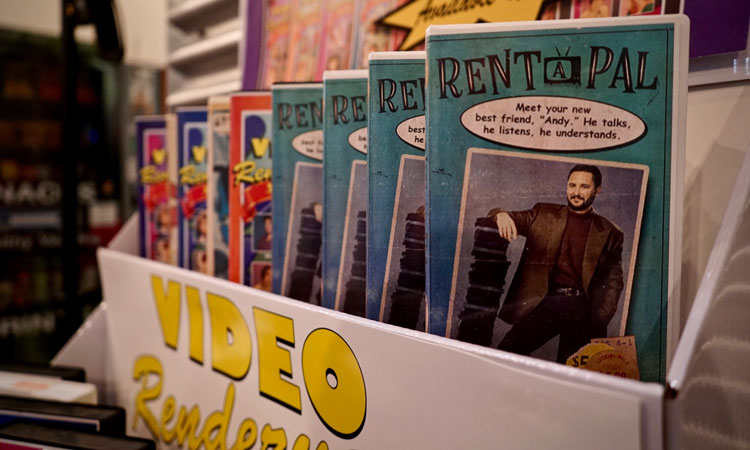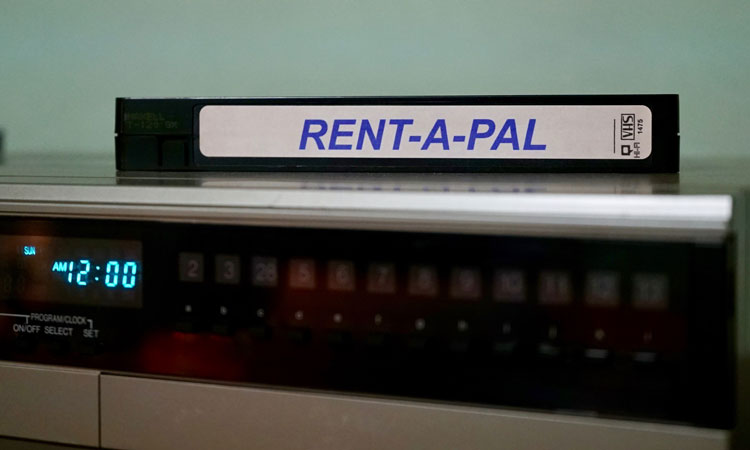Written and directed by Jon Stevenson, Rent-a-Pal is set during the Nineties and tells the story of lonely bachelor David (Brian Landis Folkins) who is searching for an escape from the day-to-day drudgery of caring for his ageing mother (Kathleen Brady). Whilst seeking a partner through a video dating service, he discovers a strange VHS tape called Rent-A-Pal.
Hosted by the charming and charismatic Andy (Wil Wheaton, Star Trek: The Next Generation, Stand By Me), the tape offers David much-needed friendship. David feels like Andy is talking directly to him, that he understands him, but when the things Andy is saying turn negative, the friendship he finds through the tape soon comes at a cost…
We spoke to Wil about Rent-a-Pal, the importance of a good script and what it is about genre that appeals…
When did Rent-a-Pal start for you?
Around a year ago my manager read [the script] and thought that it was interesting and thought that I should take a look at it. So I did and I loved it. I was on board almost right away and it was not a difficult decision to say yes to the film. The script is wonderful. The characters are extremely well-drawn and I really like this idea that we can’t be sure if Andy even exists. In the way that he is portrayed in the film, there’s a really good chance that all of this is happening in David’s head.
So could Andy and the video not exist and David is imagining it all?!
I think that it is possible because you’ll notice that Andy never says anything weird, it’s all in the way David interprets it and it just seems like maybe David has some psychosis. Or there’s something supernatural and weird going on. In either case, I thought it was a really compelling story.
This could just be David’s subconscious manifesting itself and Andy is expressing David’s deep fears. I mean, David’s lonely and he’s a caregiver. He’s trying so hard to find a connection in the world and if we accept that, if we decide that Andy isn’t real, all of that could just be David’s own insecurities starting to express themselves. It’s really these questions and the ambiguity of their answers that attracted me to the piece.
What do you think Andy’s motivations are?
I had to think about what this character’s motivations would be if he were real. Andy is deeply insecure, he’s incredibly lonely, he is super controlling and incredibly manipulative. What Andy is most afraid of is being alone and when he sees someone like David who is vulnerable, he’s a predator, so he pounces on it and all Andy wants is for this companion to just only exist to please Andy. To be Andy’s buddy, to be Andy’s pal and he will do whatever it takes to secure that.

Would you say Andy is a bad guy?
I think it’s kind of up to the audience to decide who the villain is. When I play villains I always make the choice that the villain is the hero of his own story. So the villain is justified in everything that he does, even if it’s really despicable and indefensible. Part of my job as an actor is to justify why he’s doing the things that he’s doing. The way that I justified this was really leaning into how lonely Andy is and how insecure he is.
Rent-a Pal deals with pretty big themes including loneliness and dementia. What are your thoughts on genre films being a platform to explore themes like this?
I think that good genre entertainment is at its absolute best when it is telling stories on multiple levels, and we tend to find this in science fiction, but occasionally we see in horror as well. Where the film really reflects what’s happening in the world when it was made, and it gives a social commentary, then the audience can either embrace that commentary or they can take the story as fiction and enjoy the fiction as it as it is.
One of the things that we absolutely could never have predicted when we made this movie was that we would all find ourselves at this time in our lives behind screens and really limited in our human interaction. There is a lot of loneliness and a lot of uncertainty in the world right now and we are being forced to stay in our homes and the relationships that we have are really important to get us through this time. On this story we’re looking at a person who just cannot maintain a relationship. I think that that is relevant to what a lot of people are going through right now.
It feels really relevant. We’re actually talking to each other through a screen right now…
It’s really uncommon for the entire planet to be experiencing something together, and it’s even less common for a film to come out that just happens to sort of touch on that at the same time! It’s fortunate timing in an extremely unfortunate time.
What do you think it is about genre that appeals to people?
Genre entertainment works on multiple levels. On one basic shallow level it is genre entertainment, but on a deeper level it is always examining something that matters in the world. Always, always, always whether it’s sci-fi, fantasy, or horror, which are the primary genres. I love it. I’m very fortunate that I have a career in genre entertainment. It’s one of those places where we have more passionate, engaged lifelong fans than casual popular entertainment does. That allows us who work in genre to slowly and methodically build lasting careers and we’re very fortunate to have an audience that tends to follow us around and just isn’t casual and that’s great. I really enjoy it.

We’re obviously not allowed to meet up right now, what’s it been like without conventions and meeting fans this year?
Yeah I miss it. I miss those weekends where we get together with people who love the things we love and we celebrate being nerds. I really miss that. I really really miss the camaraderie and the sense of community. We’re doing our very best to create a version of that when we have little virtual conventions on Twitch or whatever, but it’s really not the same.
How did filming your scenes work? You’re only in scenes by yourself in the movie…
The art department built a really faithful re-creation of a 1990 low budget single camera video set and we just filmed it that way. I told Jon there was no way I would be able to learn all of the dialogue, so I needed to work through a teleprompter because it is pages of dialogue with no physical movement. There are actors who can just lock that stuff into their memories and crush it when it’s time to do the work. I can’t, I can’t remember it. So I worked off of this teleprompter because that was who I was talking to, I was talking straight to camera the entire time. That let me know that the words were going to be there and it allowed me to put all of my time and energy into what I hoped were the nuances of the performance.
We shot all of Andy’s scenes in a single day. We shot them all in a row. One of the things we did that I really liked was after we got a take that we all felt really good about, Jon would give me directions and ask me to do it again in a completely different way. Maybe more gleeful this time. Now maybe more despondent, or now let’s try it very aggressively. What he ended up with was a ton of footage that let him make these editorial choices for how David is perceiving Andy. So he just let me do all these different performances and then he assembled the character in post-production and I think he did a great job with that.
It was really fun. There’s a couple of different ways to approach filmmaking, and it depends on how much time and budget you have, and we had the time because we didn’t have a lot of camera moves. The camera was just pushing in and out on a dolly and because we had that time, we had the luxury of trying different performance choices to see exactly where this character would go.

What do you look for when choosing a role?
The script’s where everything starts and if the story and the characters are not in the script, they’re never going to be on the screen.
In Rent-a-Pal I was looking at maybe a four-day commitment. Four days out of my life that I’m going to be spending on this character. Which is great, it’s a very small investment for an incredible return, being the antagonist in this picture. There are other times where I’ll read a script and I’ll see like this is two months or three months and I’m going to be miserable because there’s just no story here. Or this story is magnificent and incredible and I’m going to do everything I can to be part of it, and then I don’t get the job. You just never know. You never really know what’s going to happen, but if it’s not in the script, it will never be on the screen and that’s what I really care about.
The first question is: Do I respond to this material? Does it excite me? Does it challenge me as an actor? Does it interest me as an audience?
Then the next question is: Can I hear myself or see myself in this role? I just had an opportunity recently for a voice job that I was crazy about. I loved the script, I loved the characters, I absolutely loved the idea [but] I could not find the character’s voice. I could not make it work and I had to call my agent and say ‘I can’t do this. I don’t hear it’. Sometimes that happens. Not often, but it does, and when that happens I go to the next one instead of trying to force myself to do something that’s clearly not happening.
You also do a lot of voiceover work. With Rent-a-Pal you’re just in a room reading dialogue to yourself. Were there any parallels with your role in Rent-a-Pal and voiceover work?
That’s an interesting observation that I hadn’t thought of. With voiceover, you do not get to use your expressions at all to inform the audience and to drive the character – 100% of it happens with the vocalisations and that is challenging. That requires a very particular skillset to consistently pull off.
A small, on-camera performance is the diametric opposite of that because the performance is so intimate that a very small movement with the face, the tiniest bit of an expression change is really noticed by the audience. I can do more with less in a small performance like the performance in Rent-a-Pal than I can with a large performance in a pure voice or videogame job.
What do you think audiences will get from Rent-a-Pal?
I don’t really think of it as a message movie. It is a supernatural thriller but I think it talks about loneliness. It talks about the necessity of meaningful connection to other human beings, and it explores what happens when we are unable to make that kind of connection…
Rent-a-Pal will be available for Digital Download on 16 November.
